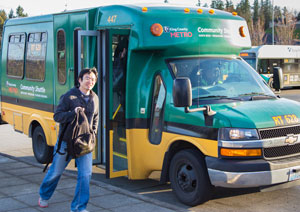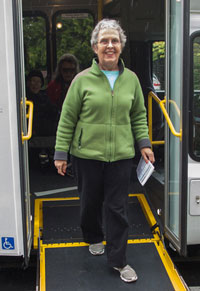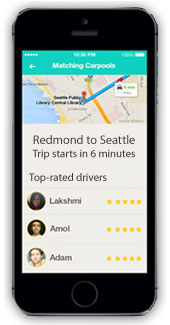Tailored to fit: Metro's alternative services
May 28, 2015
You're familiar with Metro buses, but do you know about our alternative services? Metro is working with communities where regular bus service isn't available or isn't the best fit, developing innovative, customized services to meet local transportation needs.
We're exploring both tried-and-true approaches, like shuttles operated through a Metro/community partnership, and cutting-edge ideas, such as flexible, on-demand ridesharing that uses an app to connect drivers with people who want a ride right away. The King County Council approved funding in our 2015-2016 budget to expand alternative services. Both the Council and Executive Constantine recognize that by using innovative approaches and partnering with local communities, we can meet local mobility needs and stretch our public transportation dollars.
Here's what we're up to around the county:
We've been working with a number of communities that experienced service reductions in September 2014, finding cost-effective ways to fill service gaps. In partnership with local cities, we're starting community shuttles in several areas where residents wanted regular trips to jobs or key services.

In February we launched Route 628, giving residents of North Bend and Snoqualmie peak-period connections to regional transit services at the Issaquah Highlands Park-and-Ride. This shuttle also provides new connections for Highlands residents through a flexible service area, where riders can call ahead to schedule off-route pick-ups or drop-offs. Thanks to our partners' help in getting the word out, this shuttle provides more than 60 passenger trips per day at about half the cost of the bus service it replaced.
This new Snoqualmie Valley service builds on a popular earlier project, the Valley Shuttle serving Duvall, Carnation, Fall City, Snoqualmie and North Bend. This service is funded by Metro and the Snoqualmie Tribe.

On June 8, we'll launch community shuttles in Burien and Mercer Island. The City of Burien is partnering with us to launch the new Route 631. Providing midday service, this shuttle will connect neighborhoods to critical destinations like the Burien Transit Center and Highline Medical Center and will offer flexible service in the Gregory Heights area. We recently gave a preview of the new shuttle to some Burien residents who had advocated for it (photo at right). “I'm going to sleep better tonight knowing I'll have this transportation,” one community member told us.
On Mercer Island, a new peak-hour community shuttle, Route 630, will provide flexible service in east Mercer Island and trips to First Hill and downtown Seattle. The service is jointly funded by Metro and the cities of Mercer Island and Seattle through the regional partnership program created by Seattle's Proposition 1.
Ridesharing as needed

We're also getting ready to test innovative approaches to ridesharing that give people flexibility in their day-to-day travel. An app or website matches drivers with riders—practically in real time.
We're testing a version called TripPool with an apartment community on Mercer Island. Using Metro vans, designated volunteer drivers, who are commuters themselves, will offer rides to the Mercer Island Park-and-Ride at set times. Riders can sign up on the app and hop onto any of the vans, any day. We are also exploring a Community Van concept where vans and volunteer drivers help groups make non-commute, mid-day, evening and weekend trips to set destinations such as grocery stores or a to a show.
In Redmond, we'll be testing a different approach to real-time carpooling. We're partnering with iCarpool to promote a mobile app that matches drivers and riders on a trip-by-trip basis. Drivers and riders will share the commute costs as well as the benefits, like use of HOV lanes and reduced or no tolls. We're excited about tapping into the expanding world of people-to-people transportation-sharing services.
There's more to come.
Right now we're working with southeast King County communities—Enumclaw, Renton, Maple Valley, Covington, Black Diamond, Auburn and Renton—looking for effective ways to meet unmet mobility needs. We conducted an online survey, held community meetings, and rode buses and talked with riders to identify service gaps and hear people's ideas. We used what we heard to develop service alternatives that we're discussing with the community now. Learn more »
We look forward to engaging Vashon Island residents in a conversation this summer about options for better meeting the island's unique transportation needs.
The projects underway are breaking new ground for Metro. We'll monitor them closely to see what works and what doesn't, and make adjustments along the way to improve their success. As they get established, we'll be looking for new opportunities.
Visit our alternative services website to learn more about what we're doing to leverage emerging technologies and transportation strategies to match transit services with local community needs.
Sincerely,
Kevin Desmond, General Manager
King County Metro Transit
Rob Gannon
General Manager, King County Metro Transit

If you live in King county, Metro is your public transportation system. I want you to know about our performance and the innovative service improvements we’re bringing your way.
Visit here often to read my newsletter, or sign up to receive it by e-mail.

